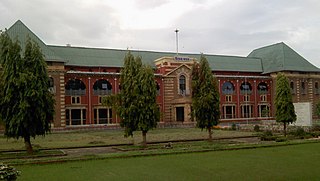
The Central Provinces and Berar was a province of British India and later the Dominion of India which existed from 1903 to 1950. It was formed by the merger of the Central Provinces with the province of Berar, which was territory leased by the British from the Hyderabad State. Through an agreement signed on 5 November 1902, 6th Nizam Mahbub Ali Khan, Asaf Jah VI leased Berar permanently to the British for an annual payment of 25 lakhs rupees. Lord Curzon decided to merge Berar with the Central Provinces, and this was proclaimed on 17 September 1903.

Berar Province, also known as the Hyderabad Assigned Districts, was a province in British India, ruled by the Nizam of Hyderabad. After 1853, it was administered by the British, although the Nizam retained formal sovereignty over the province. Azam Jah, the eldest son of the 7th Nizam, held the title of Mirza-Baig ("Prince") of Berar.

Amravati division, also known as Varhad, is an Indian one of the six administrative divisions of Maharashtra state in India. Amravati and Nagpur divisions constitute the ancient Vidarbha region. Amravati Division is bound by Madhya Pradesh state to the north, Nagpur Division to the east, Telangana state to the southeast, Marathwada region to the south and southwest, and Nashik Division to the west.

Mohammad Hidayatullah OBE pronunciation (help·info) was the 11th Chief Justice of India serving from 25 February 1968 to 16 December 1970, and the sixth vice president of India, serving from 31 August 1979 to 30 August 1984. He had also served as the acting president of India from 20 July 1969 to 24 August 1969 and from 6 October 1982 to 31 October 1982 and from 25 July 1983 to 25 July 1983 and from 25 July 1984 to 25 July 1984. He is regarded as an eminent jurist, scholar, educationist, author and linguist.

Ravishankar Shukla was a leader of the Indian National Congress, Indian independence movement activist, the Premier of the Central Provinces and Berar from 27 April 1946 to 25 January 1950, first Chief Minister of the reorganised Madhya Pradesh state from 1 November 1956 until his death on 31 December 1956, he was elected from Saraipali, Madhya Pradesh now part of the state of Chhattisgarh. He also served as Member of Constituent Assembly of India from Central Provinces and Berar.

Nagpur Municipal Corporation is the municipal body administering Nagpur, in Maharashtra state in Central India.
Nagpur Improvement Trust (NIT) is a local civic government body with the task of developing new areas within the city limits of Nagpur, India and maintaining existing city infrastructure. This trust works along with Nagpur Municipal Corporation (NMC) which is an elected body of city representatives (Corporation). NIT itself is not a democratically elected civic body and has members appointed in it from various levels like Government of Maharashtra, NMC and other representatives of Nagpur. NIT thus has a small management body as compared to NMC. NIT holds the planning and development authority for Nagpur but does not receive any funds from state government. Funds needed for development work are raised by NIT through the auction of newly developed areas.

The Central Legislative Assembly was the lower house of the Imperial Legislative Council, the legislature of British India. It was created by the Government of India Act 1919, implementing the Montagu–Chelmsford Reforms. It was also sometimes called the Indian Legislative Assembly and the Imperial Legislative Assembly. The Council of State was the upper house of the legislature for India.

Dr. Madhav Shrihari Aney ; popularly referred to as Loknayak Bapuji Aney or Bapuji Aney, was an ardent educationist, freedom fighter, statesman, a modern Sanskrit poet and a politician. He was also conferred with the title of "Loknayak Bapuji", which means "The People's Leader and Respected Father". He was one of the founders of the Congress Nationalist Party. He was first among the eminent disciples of Lokmanya Tilak such as N C Kelkar, Kakasaheb Khadilkar, Gangadhar Deshpande, Dr B S Munje, Abhyankar, T B Paranjpe and Vaman Malhar Joshi, who walked in the footsteps of Tilak. Accepting the leadership of Mahatma Gandhi on the death of Bal Gangadhar Tilak. Aney persuaded his colleagues to see the writing on the wall. At the same time he was not blind in his loyalty. He disapproved Congress throwing itself in Khilafat Movement and warned against excessive wooing of Muslims at the cost of national interests. He regarded unity at any price as elusive and dangerous. Since the best safeguard for the minority was the goodwill of the majority. He never permitted his critical faculties to be blurred by emotion. Mahatma Gandhi admiring his calm logic, confided in him and often sought his counsel. He was chosen to arbitrate the disputes between Subhash Chandra Bose and Jatindra Mohan Sengupta. He was never a breaker or a destroyer but was always a cementing factor believing in synthesis and not in segregation.

The Council of State was the upper house of the legislature for British India created by the Government of India Act 1919 from the old Imperial Legislative Council, implementing the Montagu–Chelmsford Reforms. The Central Legislative Assembly was the lower house.
Dr. Narayan Bhaskar Khare was an Indian politician. He was Chief Minister of Central Province in 1930s as Congress politician. Later he left Congress and joined Hindu Maha Sabha.
Sir Gangadhar Rao Chitnavis was an Indian landholder and politician in the Central Provinces, British India.

Sir Moropant Vishvanath Joshi was a leading barrister, social reformer and politician from Amravati, Central Provinces and Berar.

Ramrao Madhavrao Deshmukh was a prominent political and academic personality from Amravati, Maharashtra. He was one of the very few barristers from the region at that time.

General elections were held in British India between 28 October and late November 1926 to elect members of the Imperial Legislative Council and the Provincial Legislative Councils.

Vidhan Bhavan, Nagpur is the building in the Civil lines locality of Nagpur, the second capital of Maharashtra state of India, where Winter Session of the Maharashtra Legislature is held. The foundation stone of the building was laid in 1912. It was constructed by the then British command to house the administration of the Central Provinces and Berar, of which Nagpur was the capital. Later, in 1952, the CP & Berar was divided into the large central Indian state of Madhya Pradesh which included the current Madhya Pradesh, Chhattisgarh and Vidarbha regions. Nagpur was the capital of this state. In 1960, this state was further divided, with the Vidarbha region going to Maharashtra state. Thus, Nagpur lost its capital status. But, a Nagpur Pact was signed by the Maharashtra state government headed by Yashwantrao Chavan to protect the interests and equal development of the Vidarbha region. Accordingly, Nagpur was made the second capital of the Maharashtra and the winter session of the state legislature and the state legislative council was to be held at Nagpur.

Anant Ramachandra Gokhale was an educationalist. In 20th century India, many great personalities walked in multifaceted fields of Indian society. Many amongst them served the nation in different capacities through various occupations. Some of them contributed immensely in the field of education all over India. Gokhale was amongst such personalities who worked all his life for women education and welfare.
Sir Hyde Clarendon Gowan, KCSI, CSI, VD was an Australian-born British colonial administrator in India. He was Governor of the Central Provinces from 1933 to 1938.

The Bhonsles of Nagpur were a Maratha royal house that ruled the Kingdom of Nagpur from 1739-1853. They hailed from the Bhonsle clan of Marathas and were one of the most important and powerful Maratha chiefs in the Maratha Empire.













